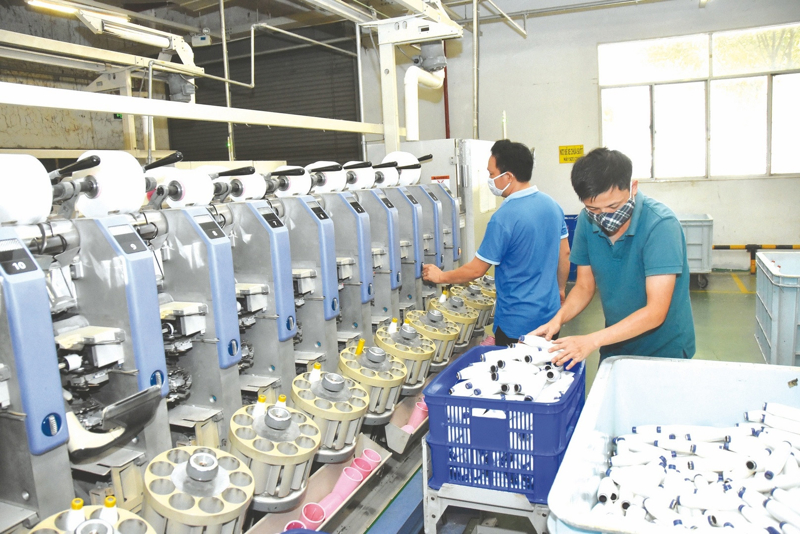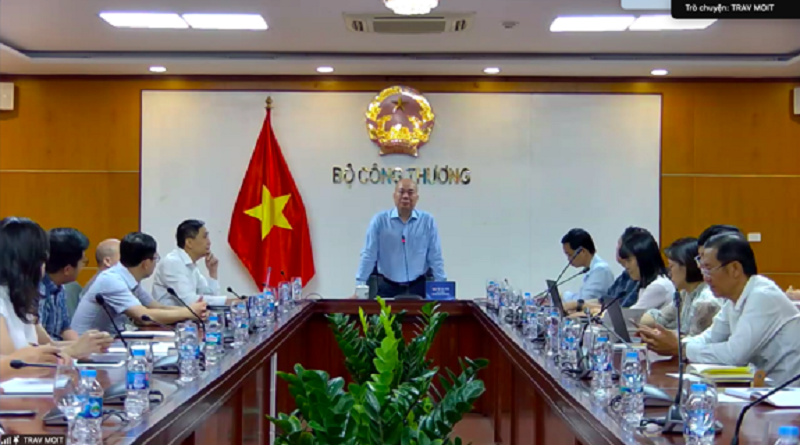
Vietnamese supporting industry enterprises possess strong manufacturing capabilities and meet international standards.
The July Trade Promotion Briefing Conference with Vietnam’s overseas trade offices, themed “Market Development for Science and Technology Products,” was held on July 31, 2025, by the Trade Promotion Agency (Ministry of Industry and Trade). The event aimed to contribute to the successful implementation of Resolution No. 57-NQ/TW dated December 22, 2024, by the Politburo on breakthroughs in the development of science, technology, innovation, and national digital transformation.
LACK OF MARKET INFORMATION REMAINS THE BIGGEST CHALLENGE
Speaking at the conference, Mr. Vu Ba Phu, Director General of the Trade Promotion Agency, said that in Vietnam, the innovation ecosystem has been taking shape and developing rapidly, with more than 3,800 tech startups, 74,000 IT enterprises, and a high-quality workforce of over 1.2 million people.
Across the country, there are currently more than 140 universities, research institutes, and startup support organizations, including incubators, centers, and innovation clubs, forming a vital network that promotes technological entrepreneurship. Various sectors have seen the strong rise of innovative startups, including in educational technology, financial technology, tourism, and real estate.
However, the Director General of the Trade Promotion Agency candidly pointed out that the consumption market for Vietnamese science and technology products abroad remains limited. This calls for close and coordinated efforts among ministries, sectors, industry associations, the business community, and especially Vietnam’s overseas trade offices — a strategic “bridge” to help bring Vietnam’s innovative products to the global market.

Mr. Vu Ba Phu, Director General of the Trade Promotion Agency, delivered the opening remarks at the briefing conference.
According to Ms. Truong Thi Chi Binh, Vice Chairwoman and Secretary General of the Vietnam Supporting Industry Association (VASI), Vietnamese supporting industry enterprises have strong manufacturing capacity and meet international standards, especially in the mechanical, plastics, electronics, and automation sectors. They are competitive for orders of moderate scale.
On the other hand, the industry has manufactured many complex components for the automotive, mechanical, plastics, wiring, printed circuit boards, and even wind turbine parts.
Ms. Binh further suggested that market access remains the greatest barrier for the supporting industry. While enterprises are skilled at manufacturing, they struggle with customer acquisition and market expansion.
Enterprises mainly produce separate components and find it challenging to advance to producing component assemblies or substitute products due to limited production volume and supply-chain issues. The domestic supply chain remains weak and less competitive compared to China and India, leading to reliance on imported materials and high costs.
In addition, the sector lacks policy prioritization. Despite its technological content and foundational role, manufacturing has not been treated by the government or relevant agencies as a high‑tech priority industry, resulting in insufficient practical support.
Similarly, Ms. Nguyen Thi Thu Giang, Vice Chairwoman and Secretary General of the Vietnam Software and IT Services Association (VINASA), shared that Vietnam’s IT industry is growing rapidly, with total revenue reaching US $142 billion in 2023 and $152 billion in 2024. The software sector alone achieved $13 billion in revenue, of which $7 billion was from exports.
The industry’s export outsourcing markets are mainly developed economies such as the U.S., Japan, and Europe, along with some Southeast Asian countries. Emerging markets of interest include China and countries in the Middle East.
A core strength is a young and high‑quality IT workforce. Vietnam has about 1.26 million IT engineers who are highly regarded internationally for their skills, particularly ranking in the global top 3 in artificial intelligence (AI), which represents its greatest competitive advantage.
Like the supporting industry, Vietnam’s software sector lacks a foreign-market presence. “Partners always ask: ‘Does your company have an office here?’ Answering ‘not yet’ can reduce chances for long‑term cooperation,” Ms. Giang noted.
Without a local representative office, it’s difficult for enterprises to build trust and long‑term relationships with partners. Causes include lack of market information, limited connection channels and effective outreach, budget constraints for marketing, and foreign‑market legal barriers.
SOLVING “ON‑THE‑GROUND PRESENCE” FOR ENTERPRISES
To address these challenges, Ms. Binh proposed that Vietnam’s overseas trade offices provide market information and actively forward foreign sourcing requests to VASI. They should facilitate connections between Vietnamese enterprises and local associations or business communities to forge relationships and explore opportunities.
They also should organize promotional activities, invite international partners to join the annual manufacturing fair in Vietnam, and arrange visits by foreign clients and partners to Vietnamese production facilities.
Trade offices should support image building and help promote Vietnam’s supporting industry capabilities at major international trade fairs to reshape perception and assert its status. Because manufacturing requires time to develop and progresses slowly, VASI representatives hope trade offices remain persistent and keep pursuing initial partner connections even if early efforts don’t succeed immediately.
Ms. Giang requested that overseas trade offices compile and provide legal information and procedures for establishing businesses or support enterprises in host countries. They should act as contact points connecting Vietnamese firms with community associations in the host country to assist participation and relationship building.
They should help solve the “on-the-ground presence” issue, such as allowing enterprises to use an address or signage at the trade office, or assist in finding shared-office models. When a partner wants to meet, trade representatives can facilitate the connection, or Vietnamese companies may join online meetings as well.
Provide information on relevant tech events and programs in the host country for Vietnamese firms to join. “We sincerely hope trade offices will introduce VINASA’s major events (such as Vietnam-Asia DX Summit, Smart City Summit...) to foreign partners and organizations to invite them to Vietnam, gradually building international‑scale tech events in Vietnam,” VINASA representatives proposed.
Mr. Do Tien Thinh, Deputy Director of the National Innovation Center (NIC) under the Ministry of Finance, also recommended overseas trade offices support promotion of Vietnam’s innovation ecosystem. They should introduce Vietnamese startups to potential foreign businesses and partners.
They should connect with reputable local venture capital funds, angel investors, major tech corporations, incubators, and accelerators to present NIC and Vietnam’s promising startups.
They should collaborate with NIC to organize forums, seminars, and exhibitions on Vietnamese innovation and startups in host countries. Organize meetings for foreign investors and tech corporations interested in learning about the Vietnamese market and cooperating with NIC or Vietnamese startups…
Source: vneconomy.vn




